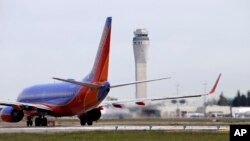The Federal Aviation Administration says it has “already made major progress” modernizing air traffic control (ATC) in the United States, but critics who say it is not deploying new technologies fast enough are pushing for splitting ATC operations off from the FAA.
FAA Administrator Michael Huerta told a U.S. Senate committee (on Commerce, Science and Transportation) hearing Tuesday that his agency has created new routes above congested areas that are saving airlines millions of dollars in fuel, decreasing carbon emissions and cutting down on airport delays thanks to its Next Generation Air Transportation System (NextGen), which is being rolled out gradually.
Huerta cited the example of Hartsfield Jackson International Airport, in the city of Atlanta (in the southeastern U.S. state of Georgia) - where, he said, the number of planes that can land per hour has been increased.
But some industry participants say the FAA’s air traffic control operations have failed to keep up with the times.
The chairman and CEO of United Airlines, Jeff Smisek, told Tuesday's hearing that 20 years ago, a flight between Ronald Reagan Washington National Airport (one of two primary airports serving Washington, D.C.) and Newark's Liberty International Airport (in the northeastern U.S. state of New Jersey) was "scheduled for under one hour.” Today, he said, "we must schedule that same flight for almost an hour and a half to account for ATC delays – more than twice the actual flying time.”
Former Michigan governor John Engler, now president of the Business Roundtable, an association of corporate chief executive officers based in Washington, said the federal budgetary process prevents the FAA from implementing the kind of technological advances achieved by corporations like AT&T and Verizon.
“In the years we’ve been talking about NextGen, both [AT&T and Verizon] have gone through four generations of cellular technology, from powering a basic flip phone to 4G streaming video in today’s modern iPhone,” Engler said.
The former governor urged the Senate committee to consider the transfer of air traffic control operations from the FAA to a new entity that is independent of federal budgetary uncertainties and able to finance large capital projects by selling bonds on Wall Street - something the FAA cannot do.
While the U.S. air traffic control system is operated by the federal government and financed through taxation, most other developed countries have abandoned systems financed directly by the national government.
Australia, Germany and New Zealand have created government corporations to provide air traffic control services. Canada, France, and Britain all have unique structures - an independent nonprofit user cooperative in Canada, a reformed government agency in France, and a public-private partnership in Britain.
All six countries avoid relying on taxation to finance their air traffic control operations, which are instead funded by weight and distance fees charged to users of the airspace.




